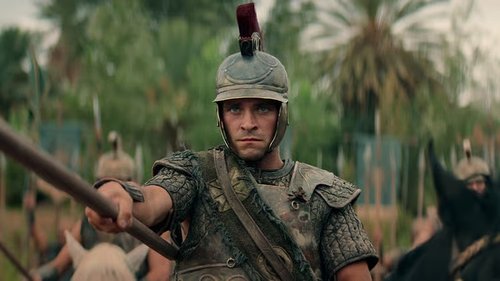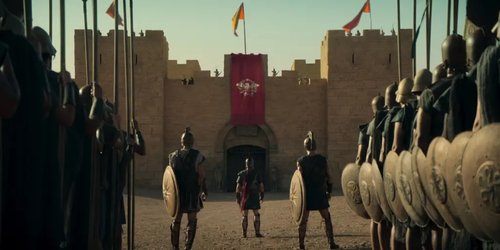A review of Alexander: The Making of a God

DEXERTO
General Stuff
It is a 6-part documentary series, released on January 31, 2024. It focuses on the political, religious and military life of Alexander the Great. It begins with his rise to the throne after the violent death of his father Philip II of Macedon and his constant struggle to achieve legitimacy before his soldiers and the generals who were loyal to his father.
The documentary is made up of a fairly wide arrangement of communicative tools and combines dramatized recreations, map-based representations, which place the viewer geographically and allow a better understanding of the herculean task that was imposed, analysis in the voice of several historians and experts in the figure of Alexander and real images of archaeological excavations in present-day Alexandria in search of evidence to better understand the almost mythological figure of Alexander the Great.
The Good Stuff
The dramatizations that include elements of his private and public life are of good quality and the battle actions are well done, perhaps not quite accurate in depicting combat techniques of the time, but they achieve the function of visually showing the regors of war. The locations for these depictions were a good achievement in the making of the documentary.
Another success of the documentary was to show the nature of Alexander's personal relationships. Cold and distant with Philip; loving, but slightly strained with Olympia his mother, deep love with Hephaestion, comradeship with Ptolemy and respect and recognition with Parmenion. Perticulary interesting was the depicting of his relationship with Statira. It is important to note that Alexander and Statira started their relationship from a very difficult position: for him, she was a prisoner of war, completely at his mercy, and embodied part of the power of the enemy he was facing. At the same time, she was a valuable strategic and psychological asset in the challenging game of confronting the largest empire of that era. So he had to decide between taking the opportunity to humiliate his adversary through his family and force him to act, or use the strategic and propaganda advantage of making an ally of the queen of the empire he was trying to conquer. In the opposite perspective, Statira suddenly found herself abandoned by her husband and completely at the mercy of what she considered a horde of barbarians, with the additional responsibility of taking care of her family. So she was forced to play all the cards at her disposal to try to survive. This creates a relationship marked by distrust and political interests. However, they came to respect each other.
Another success of the series was the accurate representation of the cultural relationships of the time. It is common in Western audiovisual products to find altered notions of reality in which Orientals are portrayed as monsters or savages (as is the case in the movie 300), but the truth is that at the time the Persian Empire was the largest that had existed and had 200 years of existence. So they considered themselves the center of the civilized world. And Babylon was the artistic, cultural, and scientific center of their sphere of influence. This is something that is very well represented in the documentary. Finally, a valuable element of the documentary was its success in representing the importance that mysticism and religion had for both Alexander as a person and for the societies of the time.

The not so good stuff
There are several elements of the documentary that are not completely in line with historical consensus and I believe they detracted from its value and quality.
Alexander's portrayal: in the documentary, Alexander is depicted as impulsive, doing things without thinking, and much of his success is attributed to luck and the ability of his generals, when many historical sources agree that Alexander was a reflective, intelligent, and educated person. He calculated every step he took and its potential consequences.
Alexander's cultural transformation: One of the most controversial aspects of Alexander's life was his ability to accept foreign cultures and customs and adapt to them. This brought him strong contradictions with his generals and followers. In the documentary, this is reduced to the concerns and warnings of Parmenion and a disagreement with Ptolemy. But the political consequences of his decision to maintain Persian satraps and governors in power if the cities did not resist him are completely left out. Also, his disagreements with Clitus "the Black," one of the generals inherited from the time of Philip, whom Alexander himself killed during a discussion on this topic. In fact, Clitus is completely left out of the documentary. There is also no mention of his policy of promoting mixed marriages between Greeks and Persians as a way to unify and consolidate the empire, which was not always well-received by the Macedonians.
The simplification of Darius's entourage: Darius III's entourage present at the military disaster of Issus was much larger than shown in the documentary. In addition to Stateira and Barsine, it included Queen Mother Sisygambis, his other daughter Dripetis, and his son Oxus, so the disaster of Issus was much greater for Darius III than depicted in the series. Another element completely eliminated was the relationship between Alexander and Sisygambis to the point that Sisygambis disowned her son in favor of Alexander and refused to be rescued at the Battle of Gaugamela. Another element to consider is that according to historical sources, Alexander's relationship was actually with Barsine and not with Stateira, and it was an official marriage.
The Companions: The Companions or Hetairoi was the name given to the royal Macedonian combat unit and in its closest circle, it consisted of young Macedonian nobles of the same generation as the king. They lived, played, trained, and studied together from a very young age and they were the king's core security, as well as his elite fighting force. The series only depicts Hephaestion and Ptolemy, but in reality, this was a larger group.
The Phalanx: The phalanx was a military formation that was fundamental in the Macedonian military doctrine, especially in Alexander's tactics. Much of his military genius relied on the strategic use of the phalanx and cavalry as complementary elements. However, in the documentary, this formation is not even mentioned.
Bucephalus: Bucephalus is an essential part of the history and myth of Alexander. The taming of Bucephalus when Alexander was 11 years old was possibly his first extraordinary action and initiated the construction of the myth around his person. So the animal itself was very important to Alexander, another omission from the documentary.
Incomplete History: The documentary ends with the conquest of Babylon and therefore leaves out a large part of Alexander's life and campaign. There is no mention of his marriages to Barsine or later to Roxana, his reaction to the death of Hephaestion, or the campaign in India and the failure it represented for Alexander.
Final Stuff
The documentary presents an entertaining and graphic approach to the history of Alexander the Great and his epic. However, it seems to leave out several important historical elements for understanding the controversial figure that Alexander the Great was. Additionally, there seems to be an intention to whitewash the historical figure by omitting important episodes from his history, such as the Death of Clitus "The Black," his excessive reaction to the death of Hephaestion, and the massacres he ordered during the campaign in India, where he killed entire cities because they dared to resist him.
Translated and formatted with Hive Translator by @noakmilo.ctt .
Wow what an interesting series I think it will be a good entertainment option for this year.
Yes it is, althought it only took me two days to finish it
But I think its very enjoyable
Hello, @gornat
I like this genre, that it provides reliable or fictitious source, motivates the viewer to investigate further, to educate himself and that the story creates a precedent in the future.
I add it to my list...Thank you!
I think you will enjoy it very much, its a very interesting option. Just look further, there is a lot more to the topic than what´s reflected in the documentary.
Luce una gran propuesta. Hace tiempo ví una película: Alexander, sobre la vida de este gran guerrero. Me pareció genial. Ahora, creo que está propuesta puede estar más cercana a la vida real de Alejandro.
@jrobe, es una propuesta interesante y entretenida, aunque tiene elementos que creo no son del todo precisos. Como entretenimiento está muy bien, ya como fuente de conocimiento es bueno solo como introductorio. Espero que la puedas disfrutar.
Congratulations @gornat! You have completed the following achievement on the Hive blockchain And have been rewarded with New badge(s)
Your next target is to reach 10000 upvotes.
You can view your badges on your board and compare yourself to others in the Ranking
If you no longer want to receive notifications, reply to this comment with the word
STOPCheck out our last posts:
!PIZZA
$PIZZA slices delivered:
@sacra97(3/15) tipped @gornat